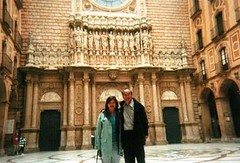"...You may fight the battle well, holding on to faith and a good conscience, which some have rejected and so have suffered shipwreck with regard to the faith". 1 Tim 1:18-19
In Ezekiel 27, there was a graphic description of a shipwreck involving heavily laden ships from Tyre, meeting a storm at sea. Mariners, sailors, merchandise and wealth and everyone on board sank. The prophecy spelled the doom of the mercantile trade of Tyre and broke the back of Tyre, a once prosperous city. It did not survive history and lie in ruins today.
Reflecting on the sudden, unexpected COVID-19 pandemic ravaging the whole world over the last month and threatening a global recession, one wonders how many businesses will be bankrupted. An infection tsunami followed by a sudden economic tornado will leave behind much devastation. Lives, families and businesses will lie in ruins, shipwrecked.
This sudden downturn can also affect the spiritual life. At times of difficulties and even during times of plenty, Paul warned that we must guard our faith, hold on tightly to it or else we may lose it all. The Boys Brigade hymn places a question for us, "Will your anchor hold in the storms of life?" This pandemic requires us to send an affirmative answer, "We have an anchor that keeps our souls, steadfast and sure while the billows roll". Our faith can be fragile and we need to be properly anchored.
 |
| Byron Bay Lighthouse |
Innumerable shipwrecks have been prevented by lighthouses. The ships were warned to steer clear of the rocky shores. Similarly we have a lighthouse in Jesus Christ warning us to steer clear of the pitfalls of life; of temptations and wrongdoings that can lead us astray.
I have always been fascinated by lighthouses. I have a collection of photographs of different lighthouses that I have visited, all over the world. The latest visit was to the Byron Bay Lighthouse in New South Wales, Australia. When one pictures the strong light that beams from the lighthouse, Jesus' proclamation comes to mind, "I am the light of the world. Whoever follows me will never walk in darkness, but will have the light of of life". These visits to the lighthouses assure me of the steadfast guidance of God. His light is constantly warning us of hidden dangers which can come so suddenly and unexpectedly.
I have always been fascinated by lighthouses. I have a collection of photographs of different lighthouses that I have visited, all over the world. The latest visit was to the Byron Bay Lighthouse in New South Wales, Australia. When one pictures the strong light that beams from the lighthouse, Jesus' proclamation comes to mind, "I am the light of the world. Whoever follows me will never walk in darkness, but will have the light of of life". These visits to the lighthouses assure me of the steadfast guidance of God. His light is constantly warning us of hidden dangers which can come so suddenly and unexpectedly.
The suddenness of the COVID-19 pandemic unsettled us. We took extraordinary precautions to guard our health. The Rev Sng Chong Hui observed, "If only we
- monitor our spiritual temperature as regularly as we do our physical temperature
- wash our souls like we wash our hands
- mask ourselves to stop sin from infecting ourselves and others
- read God's Word like we read daily updates about COVID-19
- fear God like we fear COVID-19".
 When Life is good, it pays to keep in touch with God so that with any downturn we need not become unsettled but can rely on our immutable Saviour. The whole world was enjoying peace and prosperity when suddenly this COVID-19 descended upon us. Like Charlie Brown said, "This world is suddenly crazy". Will your anchor hold?
When Life is good, it pays to keep in touch with God so that with any downturn we need not become unsettled but can rely on our immutable Saviour. The whole world was enjoying peace and prosperity when suddenly this COVID-19 descended upon us. Like Charlie Brown said, "This world is suddenly crazy". Will your anchor hold?Will your anchor hold in the storms of life,
when the clouds unfold their wings of strife?
When the strong tides lift and the cables strain,
will your anchor drift or firm remain?
Refrain:
We have an anchor that keeps the soul
steadfast and sure while the billows roll,
fastened to the rock which cannot move,
grounded firm and deep in the Saviour's love!
Will your anchor hold in the straits of fear,
when the breakers roar and the reef is near?
While the surges rave and the wild winds blow,
shall the angry waves then your bark o'er flow?
Will your eyes behold through the morning light
the city of gold and the harbour bright?
Will you anchor safe by the heavenly shore,
when life's storms are past forever more?
Lionel
Written at the start of the Covid-19 epidemic just before the global lockdowns







.jpg)




